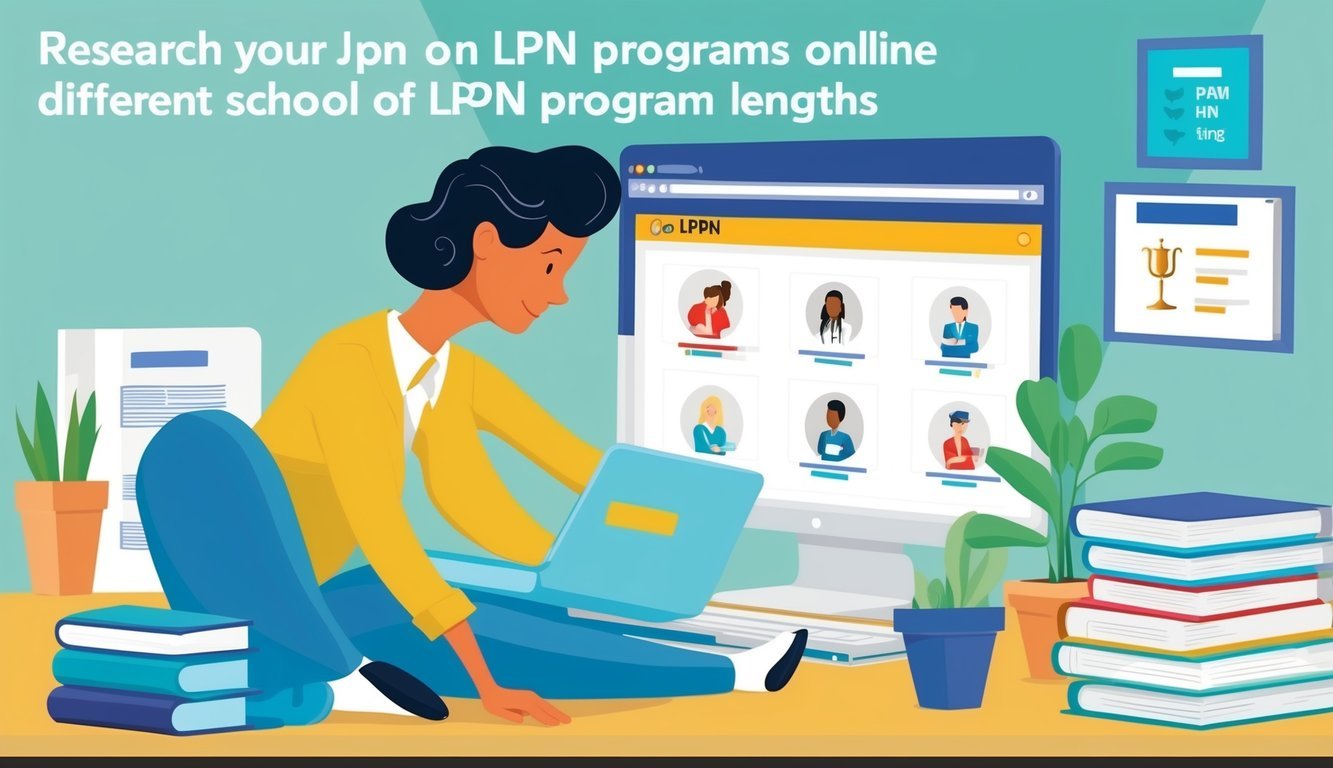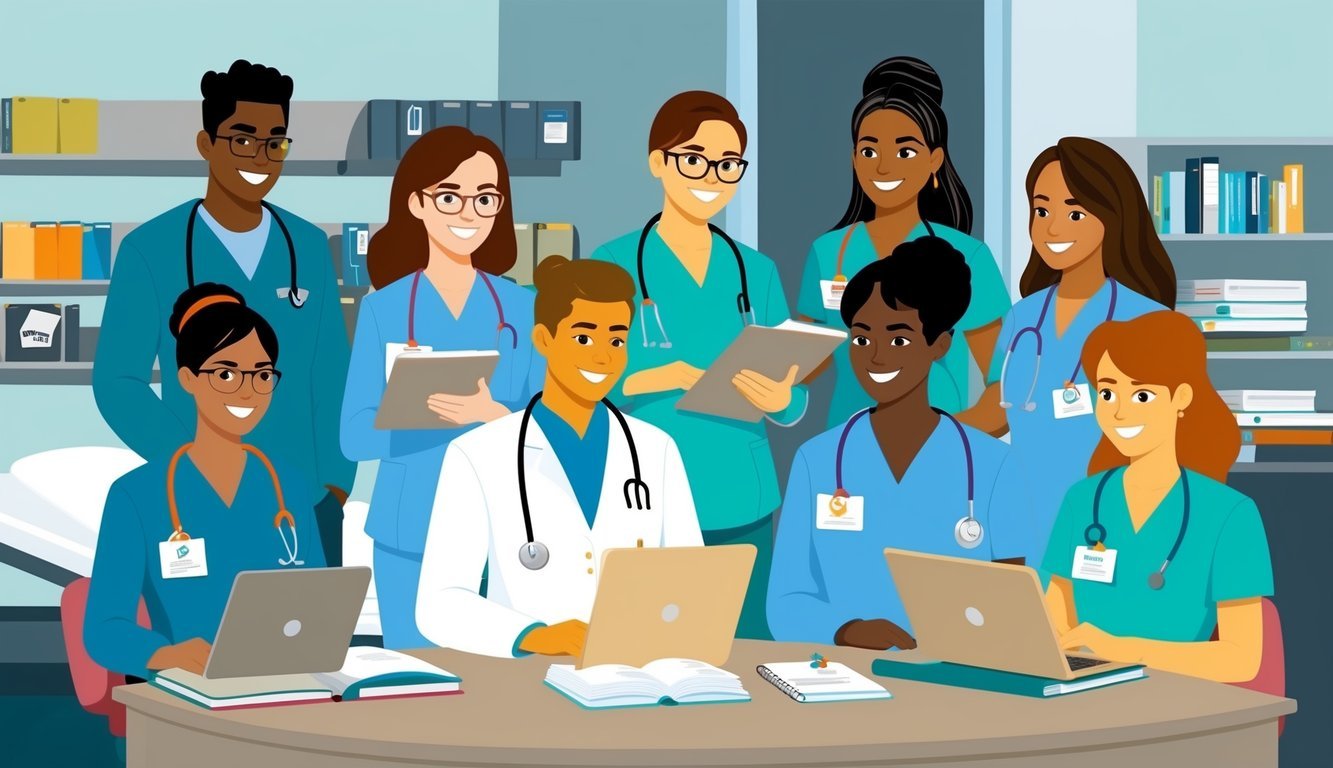If you’re eager to start your nursing career, understanding the duration of Licensed Practical Nurse (LPN) programs is crucial.
Typically, you can complete an LPN program in around six to eleven months.
The duration depends on the institution and whether you choose a full-time or accelerated course.
Many schools offer fast-track options that allow you to gain the necessary skills and knowledge in a shorter time frame.
These accelerated programs are designed for individuals who are ready to commit to an intensive training schedule.
For those balancing work or family responsibilities, part-time options may extend the duration to up to 22 months, but they still present a viable route to entering the nursing field promptly.
Exploring paths such as the Fastest Licensed Practical Nurse (LPN) Programs in 2024 can provide clearer insights.
As you consider your options, it’s important to evaluate factors such as program length, cost, and job placement rates.
Numerous resources, including 20 Best Accelerated LPN Programs, can help guide you in making an informed decision.
The right program can significantly impact your transition into a rewarding nursing career.
Exploring LPN Educational Pathways

LPN programs offer various educational pathways to help you achieve your goal of becoming a licensed practical nurse.
Understanding your options and the admission requirements is essential for making informed decisions about your nursing education.
Understanding LPN Programs
LPN programs typically lead to a certificate or diploma in practical nursing.
These programs can vary in length but often range from 12 months to 24 months.
The curriculum includes theoretical coursework and clinical experiences.
Key topics include:
- Patient Care: Understanding vital signs and basic nursing skills.
- Pharmacology: Learning about medications and their effects.
- Nutrition: Exploring dietary needs and nutritional counseling.
Accreditation is crucial when choosing a program.
A program accredited by organizations like the Accreditation Commission for Education in Nursing (ACEN) ensures it meets industry standards.
You can find various options suited to your needs, including traditional, online, and accelerated programs.
Some institutions offer faster paths like those mentioned in NursingProcess.org and allnurses.com.
Admission Requirements and Prerequisites
To enroll in an LPN program, you generally need a high school diploma or GED.
Many programs also require passing an entrance exam, which assesses your reading, math, and comprehension skills.
Additional prerequisites may include:
- Background Check: To ensure a safe healthcare environment.
- Health Screening: Documenting immunizations and overall health status.
Prospective students should check individual program requirements as they can vary widely.
Some institutions might also consider work experience or other relevant qualifications.
Understanding these requirements upfront can streamline your admission process and help you prepare effectively for your nursing education.
The Core Curriculum of LPN Training

Understanding the core curriculum of Licensed Practical Nurse (LPN) training is crucial for prospective students.
The curriculum is designed to equip you with essential technical knowledge and practical skills needed in nursing care.
Essential Courses and Content
In your LPN program, you will cover a variety of essential courses, focusing on topics like anatomy, physiology, and pharmacology.
These subjects provide the foundational knowledge necessary for effective nursing.
The curriculum typically includes:
| Course Title | Key Focus Areas |
|---|---|
| Anatomy | Human body systems, structures |
| Physiology | Functioning of organ systems |
| Pharmacology | Medication management, side effects |
| Nursing Theory | Principles of patient care |
| Medical Terminology | Healthcare vocabulary |
| Microbiology | Infection control |
In addition to these subjects, you will learn about nursing skills that are vital in various healthcare settings.
Your training will integrate clinical experiences to reinforce classroom learning.
Clinical Experience and Skills Development
Hands-on clinical experience is a pivotal component of your LPN training.
You’ll participate in clinical rotations across different healthcare environments, providing a real-world context for your theoretical knowledge.
During these rotations, you will practice:
- Nursing Care: Delivering patient assessments and implementing care plans.
- Practical Nursing Skills: Performing procedures like wound care and administering medications.
- Clinical Skills Development: Enhancing your competencies in critical thinking and effective communication.
These experiences are designed to build confidence and refine your practical nursing skills, ensuring you are prepared for various patient care scenarios.
Engaging actively in these clinical settings plays a vital role in your overall education and competencies as a licensed practical nurse.
Licensing and Certification
Understanding the requirements for licensing and certification is essential for aspiring LPNs.
Successfully navigating these steps is crucial for beginning your nursing career.
Preparing for the NCLEX-PN Exam
To become a licensed practical nurse, you must pass the NCLEX-PN exam, which assesses your understanding of nursing concepts and practices.
First, enroll in an accredited LPN program that equips you with the necessary knowledge and skills.
After completing the program, utilize resources like practice exams and study guides specifically designed for the NCLEX-PN.
In addition, consider taking the Test of Essential Academic Skills (TEAS), which evaluates your readiness for nursing school.
Many programs require this as part of the admission process, and a solid performance can bolster your application.
Study Tips:
- Set a study schedule.
- Focus on high-yield topics.
- Join study groups or review courses.
You might also want to pursue CPR certification as it is beneficial for your role.
Maintaining LPN Certification
Once you obtain your LPN license, maintaining it is essential for your professional practice.
This involves completing continuing education units (CEUs) and staying informed about changes in state regulations.
Many states require LPNs to complete a certain number of CEUs within a specific timeframe, often ranging from 10 to 30 hours annually.
Keep an eye on regulatory body updates and any mandatory specialty certifications relevant to your practice area.
Additionally, consider pursuing specialty certifications that can enhance your skills and marketability.
These certifications often require passing additional exams and can cover fields like IV therapy or pediatrics.
Maintenance Checklist:
- Complete CEUs regularly.
- Stay updated on state requirements.
- Pursue additional certifications as needed.
Being proactive in these areas not only keeps your license active but also improves your competencies in the nursing field.
Accelerated and Alternative LPN Program Options

If you’re looking to expedite your journey to becoming a Licensed Practical Nurse (LPN), various accelerated and alternative program options can help you achieve this goal efficiently.
Many pathways, including online and fast-track programs, offer flexibility and speed for students eager to enter the nursing field.
Online LPN Programs and Hybrid Options
Online LPN programs provide an accessible way for you to pursue nursing education while balancing other commitments.
These programs often combine coursework completed online with essential hands-on clinical experience at approved healthcare facilities.
A hybrid option combines online learning with in-person attendance, ensuring you receive the necessary practical training.
Many institutions, including Johnson County Community College, offer approved programs that can be completed in as little as 12 months.
You can often find 6-month online LPN programs designed for quick completion.
Fast-Track LPN Programs
Fast-track LPN programs are designed for students who want to complete their training in the shortest time possible.
These programs often last between 12 to 18 months and focus on accelerated curriculums.
For instance, Mountainland Technical College offers a program that can be completed in just two semesters.
These programs typically cover essential nursing competencies while emphasizing clinical practice to prepare you for the workforce quickly.
Check out the best accelerated LPN programs for specific options suited to your needs.
Career Progression and Advanced Opportunities for LPNs

Advancing your career as an LPN opens various pathways to further your education and specialize within the healthcare field.
Exploring options like bridge programs, advanced degrees, and specializations can enhance your skills and job prospects significantly.
Bridging to RN and BSN Degrees
Transitioning from an LPN to a Registered Nurse (RN) or pursuing a Bachelor of Science in Nursing (BSN) allows you to broaden your scope of practice.
Many healthcare facilities prefer RNs for higher-level positions, which are often more rewarding in terms of responsibilities and salary.
You can achieve this through an LPN to RN bridge program.
This program typically takes one to two years to complete and allows you to earn an Associate Degree in Nursing (ADN) or a BSN.
Completing a BSN can also position you well for future roles, including becoming a Nurse Practitioner (NP).
LPN to RN Bridge Program
The LPN to RN bridge program is designed specifically for LPNs looking to advance their careers.
This program acknowledges the skills you already possess while providing the additional training needed to meet RN competencies.
Most programs are structured to fit the busy schedules of working nurses.
They often incorporate online and evening courses.
Admission requirements typically include a nursing diploma and proof of clinical experience.
Successful completion of this program allows you to sit for the NCLEX-RN exam, paving the way for your RN license.
Specializations and Continuing Education
After becoming an RN, you can choose to specialize in various fields.
Areas like pediatrics, geriatrics, and critical care offer exciting opportunities for growth.
Specializing allows you to enhance your expertise and increase your marketability.
Many healthcare facilities encourage continuing education.
Enrolling in specialized certification programs or workshops keeps you updated with the latest practices and technologies.
These qualifications can often translate to increased job prospects and higher salaries.
Here’s a quick look at some specialization options for further education:
| Specialization | Description |
|---|---|
| Pediatrics | Focus on children and adolescents. |
| Critical Care | Work in high-stakes environments. |
| Geriatrics | Care for the elderly population. |
Pursuing these professional advancements enhances your career trajectory and can lead to fulfilling roles within healthcare.

